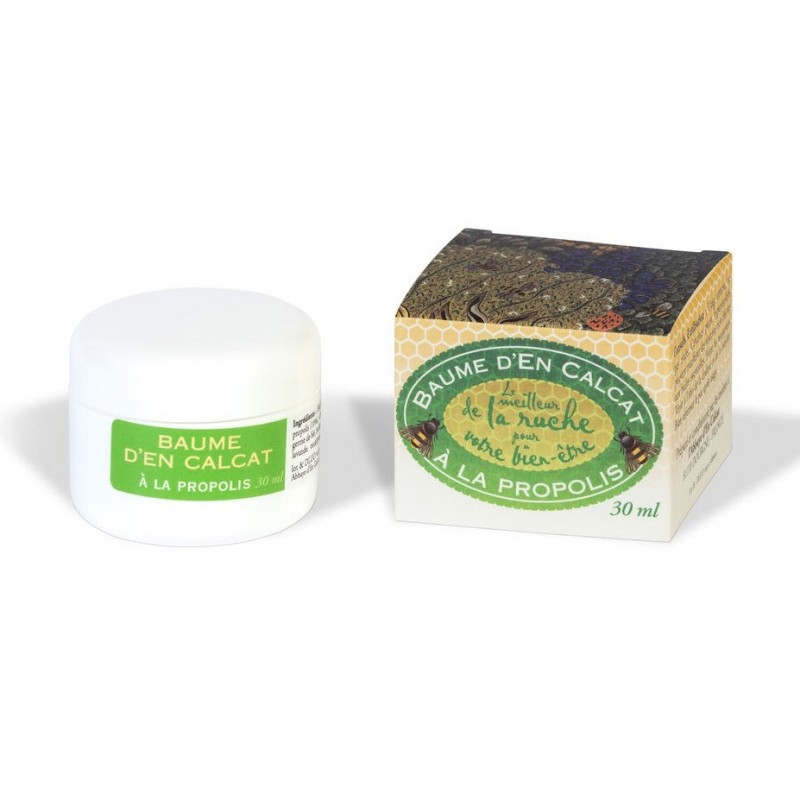Balm of En Calcat with propolis - Muscle and joint well-being
Known for over 3,000 years, propolis was used by the Egyptians for the preparation of ointments (ointment based on resin, fatty substances and various active ingredients, intended to be applied to the skin). The Greeks and Romans appreciated it for its antiseptic and healing properties.
This balm is composed of propolis and beeswax, vegetable oils and essential oils, whose virtues add up to create a unique, ultra-effective product.
Very rich in propolis (10%), it also contains organic virgin vegetable oil of sunflower, avocado and wheat germ oil, essential oils (geranium, rosemary, lavender, eucalyptus, cloves).
Used in massages, it penetrates immediately and reveals unsuspected beneficial properties. (muscle well-being after a sporting effort, joint comfort), etc.
Supplier: In Calcat Abbey
Ingredients: Organic virgin sunflower oil, propolis (10%), beeswax, avocado and wheat germ oils, essential oils (2.5%) (geranium, rosemary, lavender, eucalyptus, cloves). Without coloring or preservative.
Capacity: 30ml
Here are two texts by Father Abbot Dominique, which appeared in our review in 1969 and 1974, which reflect important elements of his thought and his spirituality (1).
THE FAITH
“Often these days we suffer and complain of feeling our faith threatened or even broken. It is already painful when you see it around you; even more painful when you experience it yourself.
Perhaps it would be good in these circumstances to recall one of those good old classical doctrines that we too much forget, and which would nevertheless be of great service, that which wants the certainties of faith not to be characterized by their clarity, by the satisfaction they bring to the mind, but by their firmness.
We talk too much about “Faith” as a body of truth, so we see in it a set of propositions, to which we are used, in which we move at ease. It is inevitable that it will end up sometimes becoming a sort of dispensation from personal thought, a refuge where one comes to rest from the ever-recurring problems of life.
The popes and the Council energetically remind us that faith is, on the contrary, what we have most personal, what demands the most of us; that it must, while remaining authentically itself, constantly re-express itself in a new way, with a difficult and constant effort; above all, that it consists less in formulations than in the commitment of a living thought to follow Christ.
A commitment is not something that necessarily brings us rest, security, the feeling of fullness of what is acquired and hoarded at all times. It often requires that special form of effort that keeps us going out of pure loyalty, even if at the time the motives are no longer obvious to us. He then appeals to that firmness of which I was speaking about faith, and which is like the share expected of us in a common adventure.
The real danger for the faith is therefore not in the movement of ideas which collide and some of which risk breaking, which would at most prove their lack of real solidity. It is in what would attack in each of us the capacity to last in this commitment.
That being said, it is much easier to struggle - for faith will always be a struggle. It is not about re-capturing a clear vision, or one that ended up appearing so through habit. It’s about nurturing a desired loyalty.
Fidelity can be heroic, almost impossible, if we are the only one to hold on and the Other betrays us, or even if we are left alone, simply because the Other is distant or disappeared. This is not the case with our faith. The Other here is Jesus, the “faithful witness”. And "he is not far from each of us." Of himself, he never deprives us of the meaning of his presence beyond what our strength of the day is capable of supporting by believing itself to be left to itself. Present or apparently absent, it is on him that we have to base our loyalty.
There are men who have never questioned a comma of their catechism, and who have no personal relationship with Christ. They don't have faith. They have beliefs, that's all; and they refuse to touch it, perhaps out of a point of honor, fear, laziness ... Those, if one day a different idea forces the door of their mind, because of its own vigor or their least resistance, it gradually ruins the whole edifice.
There are other men who, with all their soul, want to stay connected to Jesus Christ, but to whom the sentences formerly learned no longer appear certain, in whom the ideas formerly accepted without difficulty lose the clarity of their outlines and seem about to dissolve. It may happen to them to state, with hesitation or aggressiveness, sentences or ideas which one can no longer see the continuity with the teaching so far received; it is always worrying, often dangerous for them and for others, sometimes fatal. But if they do not falter in their resolve and habit of referring to the living Christ, they at least retain the root of the faith.
A collapsed house remains on the ground; a cut tree grows back, and sometimes stronger.
The question put to all Christians, a question that does not pose a threat, is, today as always: are you determined to remain attached to the beloved person of your Lord, and to receive his Word like the light on your road? If your answer is yes, then “who will separate us from the love of Christ”. "
(1) Presence of En Calcat, n ° 23, July 1969, p. 89-91; n ° 43, July 1974, p. 100-104.
EXPERIENCE OF GOD OR TRINITY EXPERIENCE
"(...) Father Abbot Germain said to us one day in a community conference, with such original humor that he sometimes brought to really serious matters:" God, that does not exist! " And he immediately added: “The Father exists, the Son exists, the Holy Spirit exists”. I believe that if, instead of talking about “the experience of God,” we wondered about our experience of the Father, or of the Son, or of the Holy Spirit, we would take a big step forward; in any case, we would benefit from the specific light that the revelation of Jesus casts on a reality experienced in all religions, in all personal journeys.
One of the spiritual teachers of our time, Monsignor Antoine Bloom, once pointed out to nuns that there are three degrees of the Christian experience.
At a first level, each one experiences certain interior events, in relation with God, experiences in himself feelings, reactions, states (even a feeling of absence, a state of dissatisfaction and expectation). He has his own individual experience, which he can decipher more or less clearly in faith.
A second type of experience is collective. We belong to a whole, the Church, and we carry within ourselves, beyond direct perception, a kind of deep awareness of what has been and still is experienced by this great body. It is quite difficult to express, but, as a member, we know in our marrow things which, without having the same degree of evidence as the immediate data of our own experience, are inscribed in us, in an almost irrefutable way.
And then there is a domain that we feel inaccessible to any experience, obviously, and where we enter only by pure faith, that is to say by listening and believing what we are told, as we are. listens to a traveler returning from an unknown country.
If I put these two thoughts face to face, that of Father Germain and that of Monsignor Bloom, it seems to me that I perceive a parallelism between them which enlightens them reciprocally.
The Father, “no one has seen him”, says Saint John (Jn 1,18), taking up a frequent theme in the Old Testament. And, in Saint John, the verb "to see", so often opposed or appended to the verb "to believe", expresses very exactly experience, as opposed to faith. If, therefore, we were to claim to have any experience of the Father, it seems to me that one could quite rightly oppose a constant biblical doctrine. Our God, if it is the Father we so designate, as Jesus himself so often does, is as transcendent and unapproachable as any that men have sought or imagined. Thinking about the
Person of the Father, we understand the impression of quasi sacrilege that some feel when faced with the desire or the affirmation of an experience that would deliver it to us.
But there you have it: the Father did not content himself with letting his "hand", his power, be seen, as when leaving Egypt, or in other similar circumstances. He sent his Son, so that henceforth not only “whoever believes in the Son believes in him who sent him”, but also “who sees him sees him who sent him” (Jn 12,44- 45). There is no other experience of the Father than that which we can have through Jesus: but it is a very real one, although indirect and as “in a mirror” (1 Cor 13:12).
That the disciples had an experience of Jesus during his earthly life, no one disputes it: “What we saw with Jesus… touched with our hands by the Word of life… this is what we announce to you” (1 Jn 1 , 1-3).
It is already more difficult to analyze the relationship they had with him after his resurrection. But this “paschal experience” of the apostles remains, with all its mystery, the central fact of the history of Revelation, even in the eyes of those who push the concern for “demythologization” to the extreme. The question we can ask ourselves is therefore only: do we also have, after twenty centuries, a “paschal experience”?
Certainly, we cannot claim something similar to what the first witnesses experienced; it would be to evacuate one of the essential aspects of what we call the Ascension, this “disappearance in the cloud” (Ac 1,9) which translates in a pictorial way the “you will not see me any more” of Jesus (Jn 16,16) . And yet, when we say, “Jesus is alive,” is that just hearsay to us? Shouldn't we be able to put into it this type of certainty which can only come from experience, and which alone allows us to claim in our turn the title of witnesses?
This is where the distinction of Monsignor Bloom seems very illuminating to me. I do not deny the individual experience that a Saint Bernard, a Saint Teresa of Avila, had of the living Jesus; it remains however exceptional, out of any standard. What is given to all Christians is to live the paschal mystery in the Church. In the Church and as a member of the Church, we receive the word of Jesus as actual and fruitful; in the Church and through the sacraments, the action of Jesus is made present and his presence active; in the Church, even without perceiving anything sensitive, in the precise and restrictive sense of the term, we experience that life is transformed by the Resurrection, gently but powerfully, in each of us, but much more in the communion that is being built between us. If Jesus had not been resurrected, we would be “the most unhappy of men” (1 Cor 15,17-19), and we are not!
Should we be content with this type of experience which is so special and, we must admit, so frustrating for our human heart? Not at all. If Jesus dared to say: "It is better for you that I go", it was to add immediately: "For then I will send you the Paraclete" (Jn 16,7). And the Paraclete, the Holy Spirit, is precisely, to use the admirable expression of a little Muslim who was preparing for baptism, “God still more in us”. I do not hesitate to translate: the Spirit is God experienced, directly, concretely, and yes, dare we say it, noticeably.
The whole meaning of Pentecost is there, and consequently all that of the paschal mystery of which it is the culmination. The Spirit was present from the beginning, had already “spoken through the prophets”; what is new at Pentecost (and since) is, according to Saint Peter's own explanation, that it is “poured out on all flesh” (Acts 2,17), and made sensitive, since it is defined: “what you see and hear” (Acts 2,33). "


















